|
| NEWS |
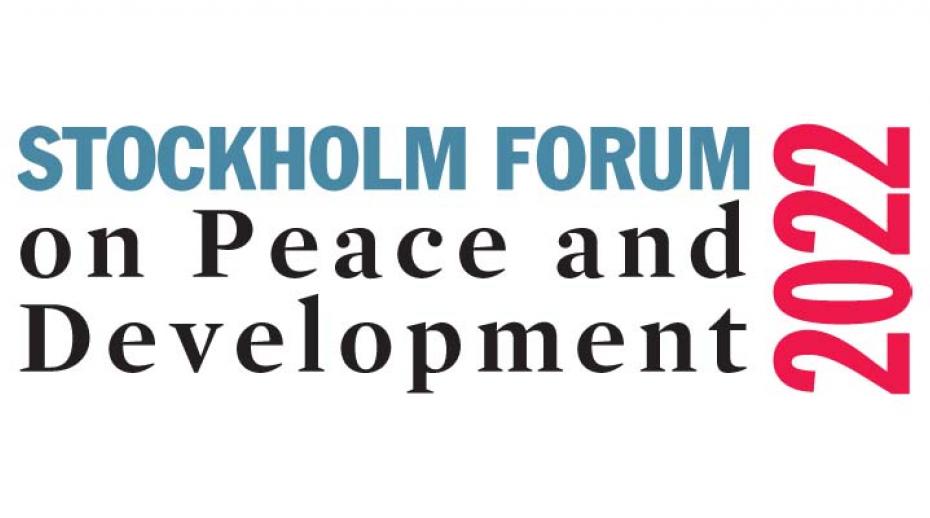 |
| Save the date: 2022 Stockholm Forum on Peace and Development |
| The ninth annual Stockholm Forum on Peace and Development will convene in a hybrid format on 23–25 May 2022. This year’s Forum will explore solutions and ways to address human security challenges in the light of environmental degradation and climate change. Recent floods, forest fires and droughts—and their association with human-induced global warming—suggest that human security can no longer be guaranteed by tweaking the margins of existing solutions. The 2022 Stockholm Forum will address how to enable an environment of peace: what needs to change within the economy, institutions, governments, organizations, companies and societies to sustain the natural environment, biodiversity, human progress and peace according to the Agenda 2030 goals? |
|
|
Read more | Watch the film on the 2021 Stockholm Forum
|
|
|
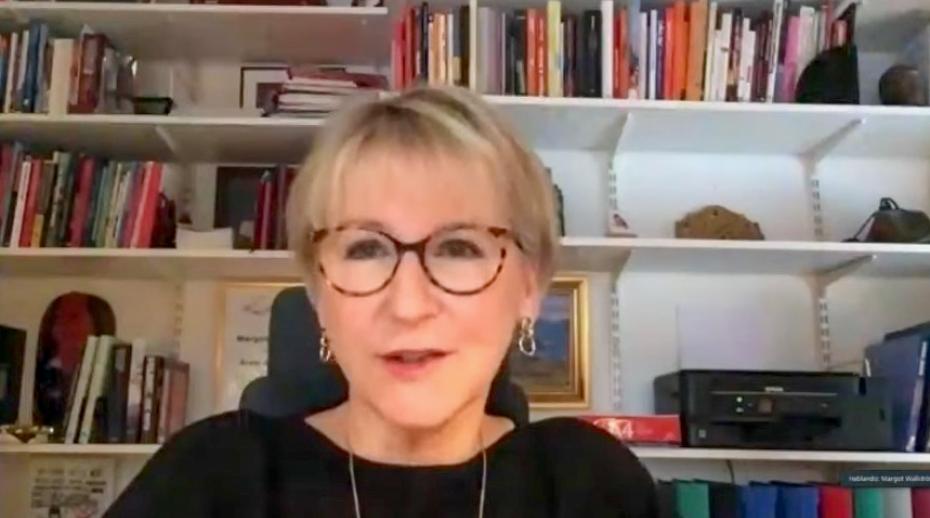 |
| Environment of Peace presented at environmental peacebuilding workshop |
|
On 9–10 December, Margot Wallström, former Swedish Minister for Foreign Affairs, introduced SIPRI’s Environment of Peace initiative during her keynote address to the ‘Workshop on Climate, Peace and Security: How to Operationalize Principles on Environmental Peacebuilding’, held in Seville, Spain.
|
|
|
Read more | Watch the keynote speech | Read more about SIPRI’s Environment of Peace initiative
|
|
|
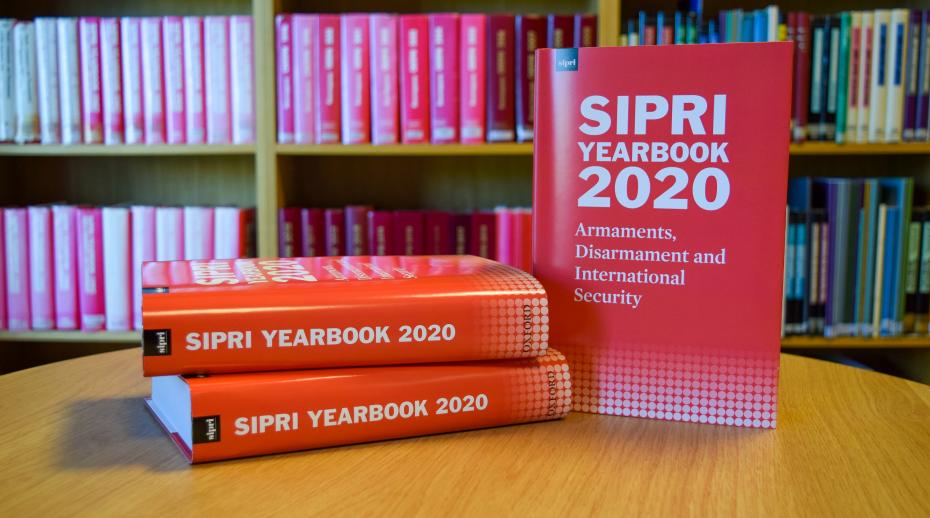 |
| Arabic translation of SIPRI Yearbook 2020 now available |
|
SIPRI, in collaboration with its translation partner, the Centre for Arab Unity Studies (CAUS), is pleased to launch the Arabic language translation of SIPRI Yearbook 2020. CAUS has published an Arabic translation of the SIPRI Yearbook almost every year since 2003.
|
|
|
Read more | Download the Arabic translation of SIPRI Yearbook 2020 (PDF)
|
|
|
 |
| Peace Points: Perspectives for 2022 |
| In the first of these two Peace Points videos, Dan Smith, SIPRI Director, discusses the state of the world at the beginning of 2022. Considering the major developments in international peace and security in 2021, Smith reflects that this era demands more cooperation than before, but the state of great power relations is putting that in question. In the second Peace Points video, Smith discusses SIPRI’s Environment of Peace initiative and its upcoming report launch at the Stockholm Forum on Peace and Development in May 2022. |
|
|
Watch the first Peace Points video | Watch the second Peace Points video | Access the Peace Points playlist
|
|
|
 |
| Environment of Peace video: Panellist Jörg Balsiger |
| In this video, Environment of Peace panellist Jörg Balsiger, Associate Professor at the University of Geneva, explains why the initiative is important to help ensure that slow violence is not ignored and that those defending the environment and human rights are protected. |
|
|
Watch the video | Read more about SIPRI’s Environment of Peace initiative
|
|
|
|
| COMMENTARY |
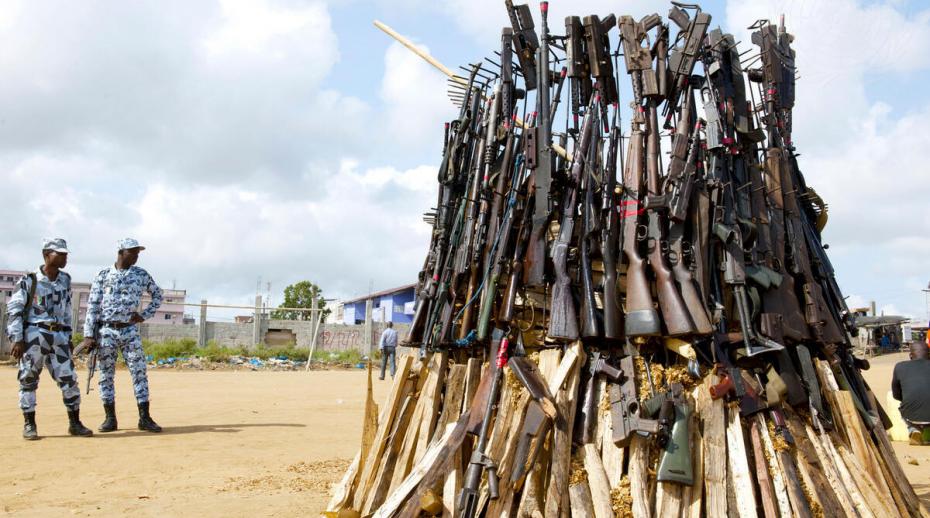 |
| SALW-related assistance to states in sub-Saharan Africa: Hitting the target or missing the mark? |
|
The cost of poorly designed or weakly enforced controls on small arms and light weapons (SALW) on crime, conflict and development in sub-Saharan Africa is well documented. Ensuring that assistance programmes effectively address states’ needs has long proved challenging. This SIPRI Topical Backgrounder seeks to assess the extent to which assistance is effectively addressing the needs of states in the region. The picture that emerges indicates that it continues to be a challenge. The backgrounder presents recommendations for future research and steps that could be taken by states, non-governmental organizations and international organizations to improve the coordination and effectiveness of SALW-related assistance efforts in sub-Saharan Africa.
|
|
Read the SIPRI Topical Backgrounder
|
|
|
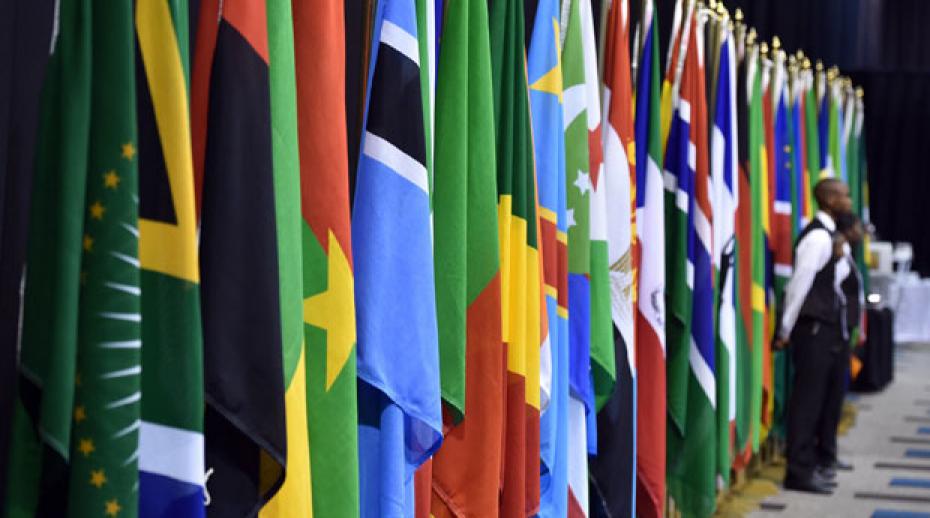 |
| What does 2022 have in store for Africa? |
|
This SIPRI WritePeace Blog looks back at governance and security events in Africa in 2021 to offer a glimmer of what lies ahead for the continent in 2022. Considering upcoming elections, conflict, military transitions and the African Union’s role, the blog identifies three important factors that will play a crucial part in how this year unfolds. These factors are the awakening of African leaders to the fact that their populations demand more and better governance; the extent to which African institutions are proactive in preventing or condemning misrule; and the way African leaders deal with political crises that could lead to armed conflict.
|
|
Read the SIPRI WritePeace Blog
|
|
|
|
|
 |
| External articles |
|
The following article by a SIPRI expert was recently published:
|
|
|
|
|
|
| UPCOMING EVENTS |
| |
| 23–25 May 2022 |
| 2022 Stockholm Forum on Peace and Development |
|
SIPRI is proud to host the 2022 Stockholm Forum on Peace and Development on the theme ‘From a Human Security Crisis Towards an Environment of Peace’. From grassroots and corporate action to global policy decisions, diverse stakeholders and participants will explore policy approaches to address the intersection between environmental stress, human security and socio-intercultural interactions. The Forum sessions will pave the way for discussions at the Stockholm +50 Conference, hosted by Sweden on 1–3 June.
|
|
Read more
|
|
| RECENT EVENTS |
| |
| 15 December 2021 |
| SIPRI hosts the Minister of Defence of Ukraine |
|
On 15 December 2021, SIPRI hosted Ukrainian Minister of Defence Oleksiy Reznikov, as part of his official visit to Sweden. During the visit, the minister engaged in a roundtable discussion with SIPRI experts as well as senior experts and representatives from international organizations and agencies.
|
|
Read more
|
|
| |
| 6–7 December 2021 |
| SIPRI at the 10th Annual EU Non-Proliferation and Disarmament Conference |
|
On 6–7 December 2021, SIPRI participated in the 10th Annual EU Non-Proliferation and Disarmament Conference. The conference, which the European Union funds, was organized by the Italian Institute of International Affairs on behalf of the EU Non-Proliferation and Disarmament Consortium (EUNPDC). Giovanna Maletta, Researcher in SIPRI’s Dual-use and Arms Trade Control Programme, chaired a session on ‘The Political Side of Arms Trade Control: From Confidence Building Measures to Sanctions and Embargoes’ and Dr Sibylle Bauer, Chair of the Consortium and Director of Studies for Armament and Disarmament at SIPRI, delivered the conference’s concluding remarks.
|
|
Read more | Watch the video of the sessions | Read more about the EUNPDC
|
|
|
| STAFF NEWS |
Three current openings
SIPRI is currently recruiting for three positions:
- Senior Researcher and Programme Director, Middle East and North Africa Programme (Closing date: 20 February).
- Senior Researcher and Programme Director, Sahel–West Africa Programme (Closing date: 20 February).
- Communications intern with a focus on events (Closing date: 10 February).
|
|
Read more
|
|
|
| PUBLICATIONS |
 |
| Pathways for Reducing Military Spending in Post-civil Conflict Settings |
| This SIPRI Insights on Peace and Security provides a comparison of post-civil conflict conditions and military burden—military spending as a share of gross domestic product—outcomes. It builds on a comparative analysis of 19 post-civil conflict episodes between 1970 and 2020, as well as three detailed case studies, to identify common pathways to post-civil conflict military burden reductions. This research finds that reductions in military burden usually follow peace agreements that encompass trustworthy and legitimate verification mechanisms, the strengthening of institutional means to resolve grievances, and improvements in relations with neighbouring countries. |
|
Read the SIPRI Insights on Peace and Security
|
|
|
 |
| Food Systems in Conflict and Peacebuilding Settings: Ways Forward |
| As of September 2021, 161 million people were estimated to be acutely food insecure. Most of these people live in countries where violent conflict is the main driver of hunger. Conflict has a direct negative impact on food systems and resultant levels of food security. This paper is part of a series that emphasizes the urgency of addressing the relationship between conflict and food insecurity. This paper explores the opportunities for breaking the pathways between food insecurity and violent conflict. It argues that for food system transformation and food security activities in conflict and peacebuilding settings to create conditions conducive to peace, it is important to apply a peacebuilding lens to food security interventions and a food security lens to peacebuilding efforts. |
|
Read the SIPRI Report
|
|
|
 |
| Peace Operations and the Challenges of Environmental Degradation and Resource Scarcity |
| Regional security entities recognize the security challenges posed by environmental degradation, the poor management of natural resources and the impacts of climate change. These non-traditional security challenges have implications for the planning, execution and closure of peace operations and shape everything from the rationale for a mission’s deployment to its operational effectiveness and long-term legacy. This paper investigates these challenges and evaluates how peace operations have dealt with these issues. It aims to stimulate open dialogue, cooperation and mutual understanding by proposing opportunities for improvement. |
|
Read the SIPRI Background Paper
|
|
|
 |
| Water Cooperation in the Horn of Africa: Addressing Drivers of Conflict and Strengthening Resilience |
| The Horn of Africa is a region exposed to the risks of water insecurity due to population growth and the impact of climate change. Growing water stress complicates many of the region’s social, political and economic difficulties, including weak governance and societal tensions between ethnic, regional or religious groups. This joint SIPRI–CIWA report explores the role of local-level cooperative initiatives in improving water resource challenges in the Horn of Africa. The report draws on three illustrative case studies of transboundary basins in cross-border regions: the Sio–Malaba–Malakishi Basin; the Dawa River and Aquifer; and the Bahr el Ghazal Basin and the Baggara Basin Aquifer. In doing so, it provides lessons learned from existing cooperative initiatives. |
|
Read the SIPRI–CIWA report
|
|
|
 |
| Taking Stock of the Arms Trade Treaty: Achievements, Challenges and Ways Forward |
| Adopted in 2013 and entered into force in December 2014, the Arms Trade Treaty (ATT) is the first legally binding international agreement that aims to establish the highest possible common standards for regulating the international trade in conventional arms, to eradicate their illicit trade and prevent their diversion. This report builds on SIPRI’s extensive work on the ATT. The report elaborates a series of policy options to strengthen these aspects of the treaty and proposes ideas that can be adopted, discussed and refined for further implementation. |
|
Read the SIPRI Report
|
|
|
 |
| Taking Stock of the Arms Trade Treaty: A Summary of Policy Options |
| Many achievements can be ascribed to the entry into force of the ATT seven years ago. At the same time, there remain areas in which the treaty can be improved or strengthened. A stocktaking exercise conducted by SIPRI has resulted in the elaboration of a series of policy options to strengthen five aspects of the treaty: its scope, the application of its prohibitions and the risk-assessment criteria, its processes and forums, promotion of its universalization, and support for states’ implementation. Taken together, these proposed measures represent a menu of options for ATT stakeholders. |
|
Read the SIPRI Policy Brief
|
|
|
 |
| SIPRI Yearbook 2021 |
SIPRI Yearbook 2021 presents a combination of original data in areas such as world military expenditure, international arms transfers, arms production, nuclear forces, armed conflicts and multilateral peace operations with state-of-the-art analysis of important aspects of arms control, peace and international security. It covers developments during 2020, including:
- the state of nuclear arms control and the entry into force of the 2017 Treaty on the Prohibition of Nuclear Weapons;
- efforts to regulate lethal autonomous weapon systems, and state behaviour in cyberspace and space;
- regional and country-specific overviews of armed conflicts; and
- the impact of the unfolding Covid-19 pandemic and the UN appeal for a global ceasefire to address it.
|
|
Browse the contents page | Download the summary (PDF) |
Order SIPRI Yearbook 2021 | Download the sample chapter on world nuclear forces (PDF)
|
|
|
| |